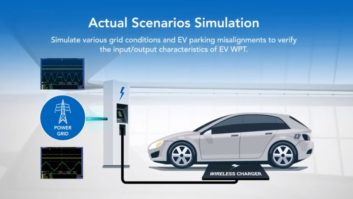The author is publisher of Inside Music Media, where this commentary first appeared. Subscription info can be found here.
Apps for everything from optional equipment to entertainment is a big attraction for auto manufacturers.
For AM or even FM radio in cars, the solution could be worse than the problem: When manufacturers stop including radio as an in-console function, the workarounds make radio less local and face unimaginable competition, but what will roll out next is even more concerning.
The straight scoop
AM interference in electric vehicles, leaving radio out of the entertainment center, making radio more difficult to access — these are the real problems that the radio industry now faces.
Fact: Electromagnetic fields generated in non-gasoline engines make AM virtually unlistenable, spurring manufacturers to leave it out.
FM is more resistant to electromagnetic fields so for the present it survives.
Ford’s popular F-150 Lightning, Tesla, Volvo, Porsche and Audi have removed AM from their electric cars.
Tesla will sell consumers an app to get radio or satellite radio for a rental fee through internet delivery that gets around the electromagnetic interference.
The rest of the story
The solutions such as a subscription to TuneIn open a can of worms for local broadcasters.
While it allows a listener to listen to their favorite local station — even AM — it also delivers thousands of other competitive choices that may seem or become more attractive.
Part of the problem is the popularity of CarPlay and Android Auto, which has retrained consumers — especially young ones — to choose from a world of streaming, programming and entertainment, not just what local radio stations are offering.
[Read More Guest Commentaries Here]
Between the music
Sen. Ed Markey is asking 20 car manufacturers to keep radio in their cars for emergencies — likely a losing battle.
Manufacturers are also claiming that AM radio drains the batteries of their electric vehicles.
The auto argument: Most radio stations are available through streaming services.
Deep dive
In spite of industry research that radio is still the number-one use of drivers’ time, manufacturers want a more modern approach.
The entertainment system has been largely commandeered by Apple and Google, a familiar interface that will make it cheaper for automakers to build cars.
Electromagnetic interference is a legitimate issue but if consumers wanted AM radio that badly, the manufacturer would have a workaround — it just isn’t that important.
SiriusXM isn’t likely to get off easy either, as manufacturers see paid apps in their future so that consumers can purchase heated steering wheels and seats for one year at a time instead of as a point-of-purchase option, and Tesla is already charging an access fee for satellite radio on top of the expense for the service.
Audi, BMW, Cadillac, Porsche and Tesla are rolling out monthly or yearly subscription plans for active driver assistance or voice recognition.
What they’re saying
Via Wired: “We’ll sell you a car with a dashcam, or that can be driven hands-free, or that can coach you with telematics data to be a better driver. But if you actually want to use any of the new toys, you’ll have to pay extra. Credit Tesla with popularizing the notion that cars could be updated with software even after they’re driven off the lot.”
My deadly honest point of view: It’s about paid subscriptions — to the manufacturer, not the radio station.
Radio sees the elimination of AM and even radio from the dash as a consumer mistake, manufacturers see it as a chance to make money.
The author is also professor at NYU Steinhardt Department of Music and Performing Arts Professions Music Business Program. His background includes clinical professor of music industry at the University of Southern California, TV, radio, program management, publishing and digital media.
Comment on this or any article. Email [email protected].










